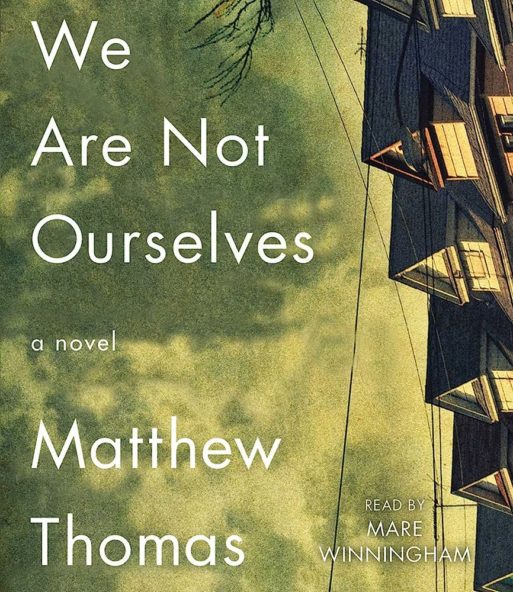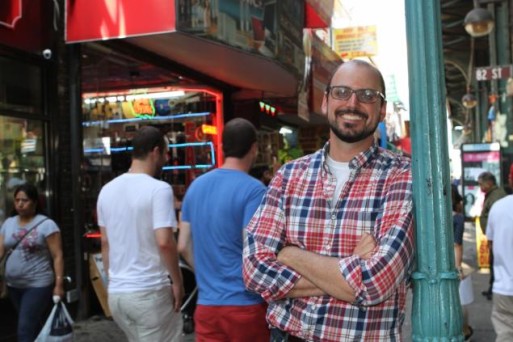 The critically acclaimed first novel by Matthew Thomas, “We Are Not Ourselves” is a sweeping tale of life, love and loss set against the backdrop of mid-century New York. The book spans six decades in the life of Eileen Tumulty, the daughter of an Irish immigrant bartender and his alcoholic wife. It is a vast, intensely engaging book about a woman’s fierce determination to create a better life for herself and her family — a life that is derailed by a tragedy she could never have foreseen. More importantly, it is a story about marriage, fidelity, heartbreak and a woman’s struggle to overcome her grief.
The critically acclaimed first novel by Matthew Thomas, “We Are Not Ourselves” is a sweeping tale of life, love and loss set against the backdrop of mid-century New York. The book spans six decades in the life of Eileen Tumulty, the daughter of an Irish immigrant bartender and his alcoholic wife. It is a vast, intensely engaging book about a woman’s fierce determination to create a better life for herself and her family — a life that is derailed by a tragedy she could never have foreseen. More importantly, it is a story about marriage, fidelity, heartbreak and a woman’s struggle to overcome her grief.
The character of Eileen Tumulty is in many ways the quintessential second-generation Irish-American woman of the 50s and 60s. Proud, unbending and intensely loyal, she endures the hardships life throws at her in an almost casual way. A caretaker all of her life, she enters St. Catherine’s Nursing School after high school graduation, not because she wants to be a nurse, but because “it was just what girls from her neighborhood did when they were bright enough to avoid the secretarial pool.” She excels at school, goes on to get her bachelor’s degree, and lands her first job.
Although their marriage seems happy, it slowly becomes apparent that Ed shares none of Eileen’s desire for upward mobility and the creature comforts of suburban life.
Soon, Eileen meets Ed Leary, a quiet, serious, almost somber scientist who in every way is the opposite of all of the hard-drinking, raucous Irishmen she has ever known. They fall in love, marry and have a son. Although their marriage seems happy, it slowly becomes apparent that Ed shares none of Eileen’s desire for upward mobility and the creature comforts of suburban life.
Eileen sets off on her own path, becoming increasingly frustrated with what she sees as Ed’s lack of drive. Nonetheless, Ed is a devoted and loving father to their son Connell, a beloved teacher, and a meticulous scientist. Despite her growing discontent with him and their marriage, Eileen perseveres.

Matthew Thomas poses for a photo near his boyhood home in Queens, New York, where much of “We Are Not Ourselves” takes place
(Credit: nydailynews.com)
To tell the rest of Eileen’s story would be to deprive the reader of the immensely satisfying experience of watching this tale unfold. Suffice it to say that Eileen, Ed and Connell soon come face to face with a reality that both terrifies and horrifies them, and ultimately spells the demise of all but one of Eileen’s hopes and dreams. At the same time, this tragedy is what ultimately shows us the depth of Eileen’s formidable character and the strength of her love.
It is in many ways a sad book, but it is also, in the end, immensely comforting in that it shows us that it is possible to emerge from grief changed, but in one piece.
“We Are Not Ourselves” is not just a novel. It is, as New York Times book critic Janet Maslin described it, “an honest, intimate family story with the power to rock you to your core.” It is in many ways a sad book, but it is also, in the end, immensely comforting in that it shows us that it is possible to emerge from grief changed, but in one piece.
At the end of the book, Thomas answers the question: “What do you hope readers will take away from Eileen’s story?” He answers, “I hope the book inspires people to feel hope in the face of despair…I hope it inspires them to conclude that we’re always capable of learning something, and that people…can evolve into more loving versions of themselves than they already are…And I hope that it inspires people to value the time they have, and their relationships, and maybe give the people who matter to them a hug.”
Trust me, it does all that, and much, much more.

 “We Are Not Ourselves” by Matthew Thomas
“We Are Not Ourselves” by Matthew Thomas


 First the Wealth Gap, Now the U.S. Has a Growing Health Gap
First the Wealth Gap, Now the U.S. Has a Growing Health Gap
 How to Comfort A Dying Loved One
How to Comfort A Dying Loved One
 Our Annual Seven Holiday Gifts for Someone Who Is Grieving, 2024 Edition
Our Annual Seven Holiday Gifts for Someone Who Is Grieving, 2024 Edition














